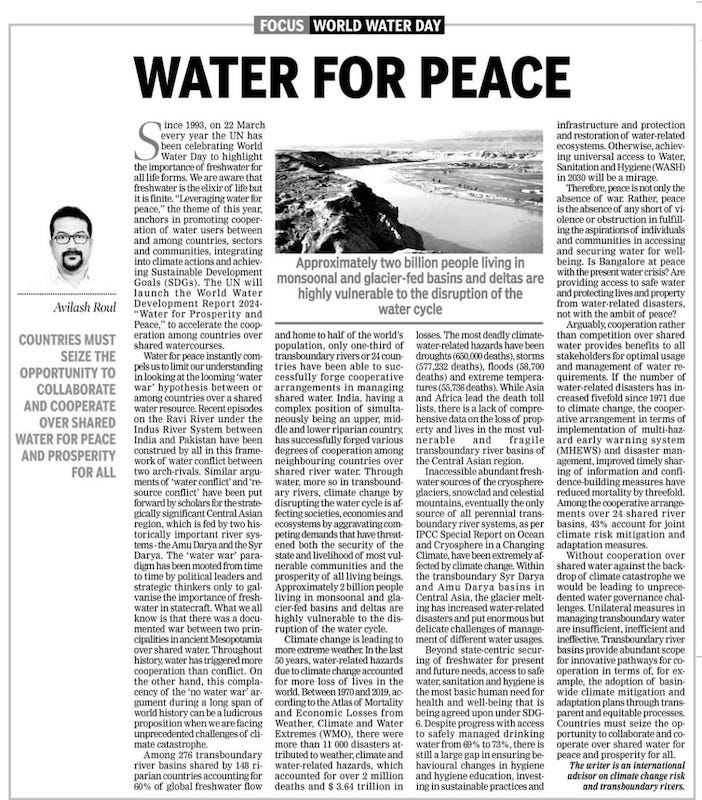Reassessing Water Security in Guiding Policy Framework
The rising threat from unpredictable and excessive rainfall, exacerbated by climate change, has warranted a conceptual debate for robust policy formulation. The urgency has never been felt more than now as we witness devastating incidents like dam breach in Laos, the State Deluge in Kerala (India) and frequent marooning of cities, including ‘smart cities’ in India, during monsoon. It has now become a common scenario across megacities and towns when torrential rains play havoc with daily lives of people leading to deaths and destruction of properties.
Gloomy State of Water Management in Odisha
It can be argued that water resources development and management in Odisha is governed by whims rather than institutions. The election manifesto (2014) of the party ruling the state presently promised to add 10.00 lakh hectare (ha.) land of irrigation coverage in next five years. This is the only document which can be referred to as 'perspective plan in water sector' so far.
Preparedness of Odisha on Inter-State River Water
Early this month, the resolution of Union Cabinet to constitute a special purpose vehicle- Polavaram Project Authority (PPA)- has caught Odisha government napping. Instead, the news has attracted cautious criticism from state government. With General election in full swing and Telengana Statehood is commencing- it is beyond obvious that political parties, , leader of oppositions including incumbent State and Union governments would left no stone unturned to gain political mileage of blame game. It is less important to read between the lines on timing of PPA.
Politics of Water Conservation: Industries vs. Agriculture
While the world is gradually moving towards green economy, Orissa is seen to be embracing brown economy. Depending on the likes of Vedanta, POSCO, batteries of sponge Iron and coal companies which have demonstrated negligible social and environmental sensitivities, the State government intends to allocate exclusive water for such industries. On August 5, the state cabinet has approved a proposal to create a 'water conservation fund' from monetary contribution of industries which use the water from October to June.
"Chinese dam concerns raise fears of future water conflict" : SSPC Senior Fellow Avilash Roul was quoted in South China Morning Post
"Chinese dam concerns raise fears of future water conflict" SOUTH CHINA MORNING POST, 05 September, 2013
Beijing's coyness over hydro plans for Tibet's Yarlung Zangbo sparks mistrust from India over downstream impact on Brahmaputra.
The sensitive issue of water sharing between China and India is again under the spotlight.
India raised its longstanding concerns about Chinese dam construction on rivers that start in China and flow into the sub-continent at the 5th round of the India-China strategic dialogue in New Delhi last month.
Transboundary Rivers in Central Asia: Geography, Geopolitics and Hydro Diplomacy
The strategically significant Central Asian region, which feeds by two historically important river systems- Amu Darya and Syr Darya with credible hydrocarbon and oil resources, is quite often attracts theories of 'resource conflict', 'water war' and 'great game'. However, cooperative management on strategic rivers to cater to the needs of riparian countries remains an unresolved issue. Presently, the UN is organising a two days (August 20-21) High-Level International Conference on Water Cooperation (HLICW) in Dushanbe, Tajikistan.
India-China Hydro Diplomacy: Beyond Information Sharing MoUs
This World Water Day (22 March 2013) calls for cooperation on transboundary rivers. Among 276 transboundary river basins in the World, it makes sense for countries in Indian subcontinent and China to consider it seriously. While the international institutions are trying to define a working definition of 'water security', will India be able to secure unhindered access to water for living beings across McMahon line - the source of all perennial rivers flowing through India?
Dehydrating Indus: India and Pakistan Need to Set Future Agenda
Thinking about a majestic river as the Indus River in South Asian set up attracts more perspective and more situation room strategies than a possible benefit sharing solution. From countless war strategies to suing each other in legal battle, from instigating to investigation, from hydro-phobia to hydro-politics, from misinformation to deliberately uninformed, India and Pakistan have been engaged in myriad exchanges and wasting time and opportunity. The exception could have been only during ancient Indus Civilisation where settlements at both sides of the river respected Indus as one.
Dynamics Demystified: India-Bangladesh Relations
According to Thomas Homer-Dixon, water will be the major source of conflict in the upcoming time. The contemporary scenario represents somewhat the same picture. Present era is marked with various kinds of conflicts where resource sharing between the nations is a big issue of contemplation, which further leads to disagreement. The conflict often arises due to unequal distribution of resources or from a dependency-led need for more resources often at the expense of neighboring states.
Paxton ported to drupal by DropThemes.in






